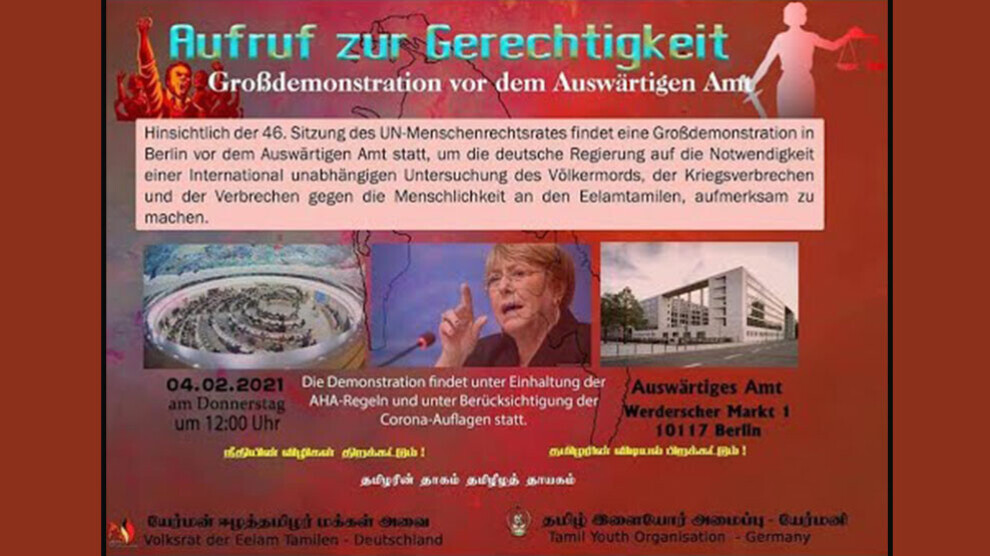Kurds join demo in Berlin in solidarity with Tamil
Tamil organizations, together with internationalists, call for an investigation into the war crimes of the government of Sri Lanka at a rally organised in Berlin today.
Tamil organizations, together with internationalists, call for an investigation into the war crimes of the government of Sri Lanka at a rally organised in Berlin today.

In March, the 46th session of the Human Rights Council will feature the 2008-2009 mass murder of Tamils by the Sri Lankan army. According to the UN, 70,000 people were murdered by the Sri Lankan army during the extermination operation against the Tamil freedom movement LTTE and the population living in the liberated areas. 146,000 people are still “missing” today. The Tamil diaspora is demanding that the UN investigate war crimes through structures independent of the Sri Lankan government.
Tamil organizations have started a signature campaign to put pressure on the German government to stand up in the UN Human Rights Council. The signatures collected as part of the campaign will be handed over to the Foreign Office in Berlin at a rally today at 12 noon.
"The demands of the Tamils are also the demands of the Kurdish people"
The Kurdish People's Council in Berlin has announced its support for today’s rally. Ismail Parmaksiz, co-chair of the council, called for participation in the protest. The fate of the Tamils is similar to that of the Kurds, and the demand to investigate war crimes is also theirs, underlined Parmaksız adding: “Tamil organizations have often taken part in our demonstrations and protests. They were always by our side in our struggle. This is also why we call on the Kurdish population in Berlin to take part in the protest rally organised by the Tamil diaspora. The demand of the Tamil people is also ours."
Kurdish and Tamil struggle for freedom: a historical connection
Despite the great physical distance, there was always a closeness between the Tamil and Kurdish struggles for freedom. As early as the early 1990s, the PKK described the Tamil LTTE as a strategic partner. In exile, in particular, there were repeated synergies. But the oppressive regimes also show parallels and depict the darkest consequences of the nation state. While Turkey is governed by a Sunni-Pan-Turkist monism of racist characteristics, Sri Lanka is dominated by a Buddhist-Sinhala monism of racist characteristics. The Tamil population is confronted with a regime of assimilation and extermination. The mass murder of the Tamil freedom movement and the population of the liberated areas was the blueprint for the Turkish “extermination plan”, which resulted in the destruction of Kurdish cities in 2015/16 and the basis for the invasion of South Kurdistan and Rojava. This parallel is not accidental, because the Turkish regime refers positively to the genocide by the Sinhalese army and speaks of a "Tamil solution" to the Kurdish question - a euphemism for genocide and mass murder. It is therefore no coincidence that the chairman of the People's Council of Tamil Eelam in Germany, Gopalapillai Jeyasangar, declared: "Just as the oppressive regimes support each other, so the oppressed peoples must also fight together."